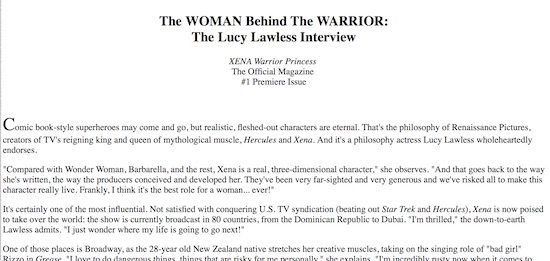
From National Public Radio (no link, because they’re assholes):
In February, Pope Francis acknowledged a longstanding dirty secret in the Roman Catholic Church — the sexual abuse of nuns by priests.
It’s an issue that had long been kept under wraps, but in the #MeToo era, a #NunsToo movement has emerged, and now sexual abuse is more widely discussed.
The Vatican’s wall of silence was first broken in Women Church World, a supplement of the official Vatican daily, L’Osservatore Romano. An article in the February issue by editor Lucetta Scaraffia — a history professor, mother and feminist — blamed abuse of women and minors on the clerical culture of the all-powerful priesthood. The piece was based on hundreds of stories she heard from nuns.
It’s very hard for a nun to report she has been raped by a priest, says Scaraffia, because of the mindset that, in sex, women can always say no.
“These nuns believe they’re the guilty ones for having seduced that holy man into committing sin,” she says, “because that’s what they’ve always been taught.”
Adding to the trauma, she says, raped nuns who get pregnant become outcasts from their orders.
I’m sure this happens occasionally, and I’m also sure that the Catholic Church attempts to cover it up when it does; but, does anyone really think this is some sort of epidemic? Are churches and missions run like Bosnian rape camps?
Incidentally, in case any of my readers are wondering as to what these hot nuns look like, here’s another specimen that tells lots of stories about her own irresistibility to the average priest.

Would you sexually assault this wimminz?
I didn’t think so.
I am not a Catholic, but I did my undergrad at a Jesuit school, and I went to mass regularly for about four years, when I lived in a heavily Catholic town. I have known a fair number of priests and nuns, and have some personal observations…
Priests join the priesthood either because they are idealistic strivers, who think they can do some good in the world, or because they are flaming faggots, who think that they can meet other gay men this way. Sadly, the split is about fifty-fifty, and anyone who cares to venture into a few services will rapidly get a clue as to which end of the bell-curve his own local fadda sits.
Nuns join their orders largely because they don’t have other options. A girl becomes a nun because she’s not attractive enough to find and keep a man, and because she’s not ambitious enough to get a degree in chemistry or English, and become a schoolteacher. Again, venture into your local Catholic church and tell me how many hot, bright, smily nuns you meet… All the ones I’ve crossed paths with look like the two wimminz pictured above.
“The Vatican is a world of men,” she says. “Some truly are men of God. Others have been ruined by power. The key to these secrets and silence is … abuse of power. They climb up a career staircase toward evil.”
Aubin, who also works on Women Church World, describes women’s treatment inside the male Vatican world this way: “We are unobserved, invisible, ignored and not respected.”
The first extensive report on abuse of women in the church was in 1994 by an Irish nun, Sister Maura O’Donohue. Her report covered more than 20 countries — mostly in Africa, but also Ireland, Italy, the Philippines and the United States.
In the report, O’Donohue, who died in 2015, linked sexual abuse of nuns in Africa to the AIDS epidemic: Religious sisters were considered less likely to carry the virus.
She cited a 1988 case from Malawi, where a bishop dismissed the leaders of a women’s religious order because they complained that 29 nuns had been made pregnant by local priests. She also reported that a priest arranged for a nun to have an abortion; the nun died during the abortion, and the priest then officiated at her funeral.
The nuns in this report are painted as a gaggle of poor victims, but we don’t know the circumstances. While I don’t know what happened, I find it perfectly plausible to imagine that:
1. Sister Skanky flirted with, groped, made eyes at, and eventually spread her legs for any man-of-the-loin-cloth who would give her some dick and attention.
2. Sister Skanky returned to brag to other nuns about how she was fucking every swinging dick in the local parish.
3. Wimminz, competitive creatures that they are, took note, and all the other nuns started competing for sexy time with all the male clergy they had access to.
4. Twenty-nine of the nuns became pregnant. Most begged for abortions, because while they knew they were sluts, they would be horrified to have their sluttery confirmed in the collective consciousness of the community.
5. One nun died because of the voluntary, elective abortion she begged for.
O’Donohue briefed Vatican officials on her findings, but the document was shelved. Its contents were made public only in 2001 by the National Catholic Reporter, which also publicized another report, from 1998, titled “The Problem of the Sexual Abuse of African Religious in Africa and in Rome.”
Again, if this was “sexual abuse,” at least one of the twenty-nine poor victims would have approached the civil authorities in Malawi with a complaint. Forcible rape is a crime there. The fact that this story only got told when some butch dyke talked to the press makes it hard to take at face-value.


 Don’t follow the light at the end of the tunnel
Don’t follow the light at the end of the tunnel It might be beautiful, but it’s still isolated.
It might be beautiful, but it’s still isolated.










